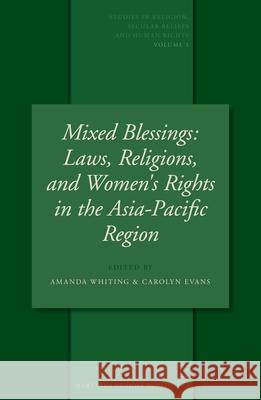Mixed Blessings: Laws, Religions, and Women's Rights in the Asia-Pacific Region » książka
Mixed Blessings: Laws, Religions, and Women's Rights in the Asia-Pacific Region
ISBN-13: 9789004151413 / Angielski / Twarda / 2006 / 284 str.
The essays in this volume explore some of the diverse and contradictory ways that the lives of women in the Asia-Pacific region are shaped by two powerful regimes - 'religion' and 'law' - and by the interactions between them. They show that for women, laws - customary, colonial, post-independence and international - and religions - indigenous or introduced, Buddhism, Christianity, Islam and Confucianism - have been a 'mixed blessing'. These diverse legal systems and religious doctrines and institutions have variously denied women authority and the capacity to participate fully in the public organization of social, political and religious life; they have furthermore constructed gender and familial relations in ways that subordinate women. Yet they have also offered promises of women's empowerment, and provided rules and procedures, norms, values, and interpretations of sacred traditions to deliver those empancipatory promises. Each chapter is devoted to a single state; first, the history and current framework of the national legal system is introduced; then the place of religion in the state is explained; and finally, by means of precise and detailed case studies or examples, each author explores how these sometimes competing, sometimes colluding regimes constructed women and how women interpreted this positioning and sought to resituate themselves.











